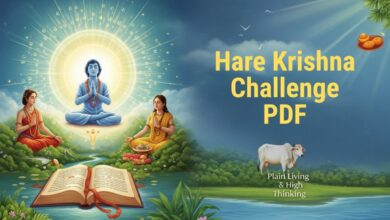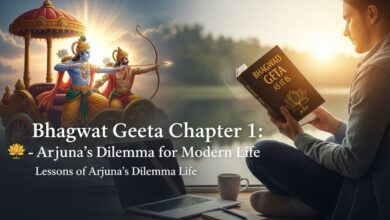Lessons From Bhagwat Geeta Adhyay 1 | Most Practical Tips
The Bhagavad Gita is among the most esteemed texts of spirituality in the world today. Bhagwat Geeta Adhyay 1 (Chapter 1) is named Arjuna Vishada Yoga, meaning “The Yoga of Arjuna’s Sorrow.” It opens with a bold scene. Two armies are poised for battle at Kurukshetra. Arjuna, the great warrior, asks Krishna, his guide and charioteer, to put his chariot in the middle of the battlefield. From there, Arjuna sees teachers, family, and friends on both sides.
This chapter highlights the human experience of facing tough choices, feeling overwhelmed and struggling with responsibilities.
The Battlefield of Kurukshetra
The battlefield of Kurukshetra is not simply a physical site, but instead stands as an analogy for the challenges that people will face in life.
The chapter begins with King Dhritarashtra asking his advisor Sanjaya to tell him what is happening on the battlefield. Sanjaya, narrating, gives an elaborate description of the armies, their commanders, and the tenor of war.
For a newcomer to the epic, this may feel like a prologue introducing the characters of a play. The more profound and real point, however, is that every human being can be described as fighting on a “battlefield” at a point in his or her life. There may not be swords and helmets, but there will be choices, division, issues of differing responsibilities, etc.
The fact that members of both families are involved creates an emotional element to the conflict. It is no longer just an issue of winning; values, protections, and relations must also be considered.
For modern day readers in the United States, for example, try to imagine a scenario where personal values clash with professional obligations, or personal choices collide with family expectations. That is the conflict Arjuna is now facing here.
Bhagwat Geeta PDF book is available to read for free.
Arjuna’s Emotional Struggle and Confusion
Arjuna, a person of great strength and skill, feels weak. His heart is sunk, his body trembles, and he doesn’t want to fight anymore.
He is concerned that he may kill his family and his teachers in the battle. He is worried about the war ruining the tradition and honour. He believes that it is better to fall back than to fight.
Arjuna’s collapse illustrates that even strong people will feel fear, guilt, and indecision.
Why Arjuna Refused to Fight
Arjuna’s refusal does not stem from a lack of determination or fear. It arises from compassion and attachment to the people he loves who are fighting against him, as well as the inability to comprehend a win through the suffering of others.
It teaches us that sometimes emotions can influence an otherwise sound decision. While compassion is a good thing, it cannot move us when we need to act. In this instance, compassion becomes a hindrance to getting the job done.
What This Teaches us About Inner Conflict
Arjuna’s situation reflects what happens inside us during inner conflict.
We know what must be done, but emotions hold us back.
For example, someone might avoid taking a new job because of fear of failure, even if it could improve their life. Arjuna’s conflict is similar—wanting peace but unable to ignore responsibility.
Key Lessons from Bhagwat Geeta Adhyay 1 For Daily Life
Without delving into religious aspects, Chapter 1 provides some very practical lessons:
- Overthinking can paralyze action: Arjuna thought too much and found himself frozen.
- Emotion can cloud judgment: Emotions are good, compassion is noble, but nevertheless emotions must be balanced with duty.
- Everything has consequences: Even not making a choice means you have chosen to not take responsibility.
- Courage is acting in spite of fear: Strength is not the absence of fear, but clarity of vision while you process and move forward.
These are lessons that are universal. After all, when at some time or another, being a student, in business, or as a leader, you will experience situations that will bring you to a standstill, make you overthink, or make you feel helpless. This chapter reminds you that even the greatest of heroes experience uncertainty.
Dealing with Overthinking and Doubts
Arjuna’s thoughts continue to spiral to the point where he cannot act. In the same way, modern life often forces us into this endless thinking—often a career, relationship, or financial choice.
The lesson here is simple: Don’t allow thinking to take the place of action. Reflect, pause, and then act.
Making Decisions During Stressful Times
Significant decisions usually occur in a very challenging context of stress. Just like Arjuna, we may feel paralysed, frozen and unbalanced. The key here is to recognise the emotional turmoil in which we find ourselves, but we cannot let it rule us. Use the balance between logic, feeling, and responsibility.
Top 5 Daily Life Usable Shloka From Geeta
Practical Teachings From Bhagwat Geeta Verses
Verse 1.28 – 29
dṛiṣhṭvemaṁ sva-janaṁ kṛiṣhṇa yuyutsuṁ samupasthitam
sīdanti mama gātrāṇi mukhaṁ cha pariśhuṣhyati || 28 ||vepathuśh cha śharīre me roma-harṣhaśh cha jāyate
gāṇḍīvaṁ sraṁsate hastāt tvak chaiva paridahyate || 29 ||
Translation:
Arjuna said: O Krishna, in the presence of my friends and relatives ready to fight, my body is unable to stand. My limbs are shaking and my mouth becomes dry. My body is quaking, and my hair stands up. My bow slips from my hand, and my skin is burning.
One-Liner: Arjuna feels weak and helpless when he sees his loved ones ready to fight.
Life Lesson:
Even the most powerful of us may lose it because of our emotions. In real life, this is during times when our emotions are charged of making some sort of decision about stress on family, work, or personally. So, the lesson is: accept your emotions, don’t deny them. When you are honest this is a window to what is truly possible.
Verse 1.31
na cha śhreyo ’nupaśhyāmi hatvā sva-janam āhave
Translation:
I don’t see how killing my own kinsmen in this battle can be good, nor can I, dear Krishna, desire a subsequent victory, kingdom, or happiness.
One-Liner: Arjuna questions whether winning at the cost of family is worth it.
Life Lesson:
There are instances when success can seem hollow if the individual has had to make sacrifices in regard to their core values and relationships. In life, the pursuit of money, promotions, or fame should never be to the detriment of one’s peace of mind, family’s stability, or moral compass. A successful life is a balanced life.
Verse 1.47
evam uktvārjunaḥ saṅkhye rathopastha upāviśhat
visṛijya sa-śharaṁ chāpaṁ śhoka-saṁvigna-mānasaḥ
Translation:
Sanjaya stated: Arjuna, after speaking in this manner on the battlefield, left behind his bow and arrows and sat down on the chariot, overcome with grief in his heart.
One-Liner: Arjuna gives up and surrenders to despair.
Life Lesson:
There are times when we might feel like giving up. But this passage shows that acknowledgement of our own frailty doesn’t mean ‘failure,’ it means we are ready to step into the growth process. Only when we accept not knowing at the outset can we receive the required direction, much like Arjuna did later to Krishna.
Conclusion: Preparing for the wisdom of Krishna
Chapter 1 concludes with Arjuna lowering his bow, sinking into despair—he submits to his feelings. This paves the way for Krishna to speak in Chapter 2. The lesson is that admitting weakness is a prerequisite to finding strength. In life, we commonly experience confusion before obtaining wisdom. Arjuna’s powerlessness is the door to transformation for him.
Consequently, this chapter is about more than an ancient Indian warrior. It is about recognizing when we feel powerless in our lives-verging on asking for help.




